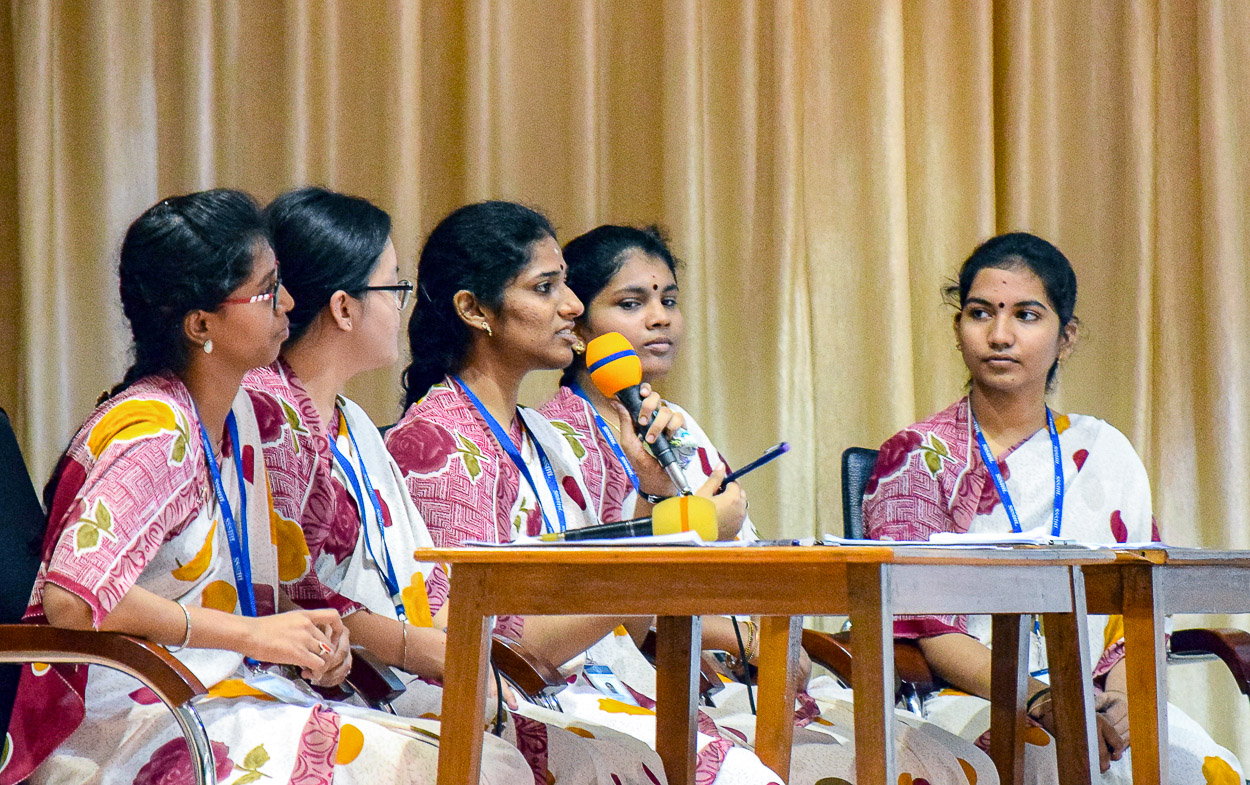
A food and nutrition specialist plays an increasingly important role as health has become a mainstream and topical issue in society. The comprehensive curriculum at the undergraduate and postgraduate level provides a strong academic training in fundamentals and applied aspects of nutrition and food science. The program content is wide and varied. It provides an exciting opportunity for students to develop an in-depth scientific understanding of food science and technology through courses such as culinary science, food quality control, microbiology and food chemistry, as well as courses that impart critical thinking and innovation skills needed for the development of new and innovative food products. It is also designed to provide a thorough understanding of the role of diet and nutrition in health and the prevention of major diseases both from the biological and social science perspectives. The course is strengthened with ancillary courses in physiology, biochemistry and computer basics. Students receive basic theoretical and practical training in all the major areas.
The postgraduate curriculum additionally covers the advanced and specialized courses in Clinical Nutrition, Functional Foods, Molecular Nutrition, Ayurvedic Nutrition, Nutritional Counseling, Public Health Nutrition, Food Product Development, Food Quality and Safety, Food Entrepreneurship. These courses along with project work in two areas of specialization (Applied Nutrition and Food Technology) are designed to help the students to pursue research and career in various Health Care Institutions, Food Industries and NGOs with particular emphasis on community service. The Department offers expertise and excellent facilities for interdisciplinary research and projects in theoretical as well as technological areas.
Vision
To impart quality education with professional excellence and integrate teaching, research and service across varied basic and applied disciplines of food and nutritional sciences.
Programmes Offered
Postgraduate
M.Sc. in Food & Nutritional Sciences
Research
Ph.D.
Facilities
The department has a good collection of a variety of books and journals in different areas of food and nutritional sciences. It is also equipped with computers to aid in post graduate seminar preparation and project work.
It also houses the following well equipped lab facilities to undertake a wide range of analysis:
Experimental and Clinical Nutrition Laboratory
Blood Analyser- RFCL, Clinical centrifuge, Cyclo mixer, Digital pH meter, Distillation unit, Double Beam UV-Visible Spectrophotometer, Fluorimeter, Glucometer, Mircro-centrifuge, Shaking incubator, Tissue Homogenizer, Water bath incubator shaker
Food Chemistry and analytical Laboratory
Bench Top High Speed Centrifuge, Digital colorimeter, Digital refracto-polarimeter, Fibertron Automated Crude Fiber Analyser, Digital water bath, Kjeltron – Automated Protein Digestion and Distillation Unit, Mechanical Shaker, Mini quartz Distillation unit, Muffle furnace, Ovens (Hot Air and Vacuum), Precisa analytical balance, Rotary Evaporator, Soxtron – Automated Fat Extracting Equipment, Spinx vortex mixer, Thermo Scientific Varioskan Lux (Multi-Functional Mode Reader)
Food Processing and Technology Laboratory
COBB tester, Ezidri Dehydrator, Gerber Centrifuge, Gyratory sieve shaker, Heat Sealing Machine, Homogenizer, Lyophilizer, Piteba Oil expeller, Portable penetrometer, Solar Drier, Vacuum sealing machine
Food Quality Control Laboratory
Abbe refractometer, Bostwick Consistometer, Brookefield Viscometer, Bulk Density Apparatus, Dansensor Head Space Analyzer, Deep Freezer, Digital butyro refractrometer, Digital Colour Reader (Konica Minolta), Digital Fruit Pressure Tester, Digital hand held refractometer, Digital hand-held salt meter, Lovibond Tintometer, Orion Fluoride Tracer, Water Activity Meter (Novasina)
Food Microbiology Laboratory
Autoclave, Binocular research microscope, BOD incubator, Digital Colony Counter (Interscience), Laminar Air Flow Chamber, Olympus Trinocular Microscope, Refrigerator, Turbidometer
Food Science and Culinary Science Laboratory
Electronic blender, Electronic food processor, OTG, microwave and halogen ovens, Electronic sandwich toaster, Electronic weighing balance, Prestige centrifugal juicer, Murphy Richards juice extractor, Induction cooktop and gas ranges, Maple hand blender with chopper, Refrigerator, RO water purifier, Table top grinders, Tomato processor
Nutritional Biochemistry and Human Physiology Laboratory
Colorimeter, Semi-auto biochemistry analyser, Digital balance, Digital Sphygmomanometer, Hot plate, Magnetic stirrer, Rotary shaker, Shali’s Hemocytometer, Water bath
Public Health and Nutrition Laboratory
Harpenden skin fold calipers, Infantometer, MUAC measurement scale, Wall mounted growth stature meter, Weighing scale
Faculty
Achievements & Participation 2019/20
Prof. (Mrs.) B Andallu
Invited talk on Role of Phytochemicals in Spices in Healthcare, 107th Indian Science Congress, University of Agricultural Sciences, Bangalore, 3-7 Jan 2020.
Attended a webinar and Q&A session on Ayurveda Protection – Health Tips from World Renowned Experts, 30 May 2020.
Dr. (Mrs.) A Sumana
Nominated as a member of the Board of Studies (2019/20 and 2020/21), Dept. of Home Science, KVR Government College for Women, Kurnool, Andhra Pradesh.
Attended a webinar on Innovation & Entrepreneurship Ecosystem in Educational Institutes, SIES College of Arts, Science and Commerce affiliated to University of Mumbai in Collaboration with IITB-DSS School of Entrepreneurship, IIT-B’e-cell and ENACTUS India, Mumbai, 17 May 2020
Attended a webinar on Post Covid-19: Challenges and Opportunities for Indian Food Industry, MOP Vaishnav College for Women, Chennai, 25 May 2020
Attended a webinar and Q&A session on Ayurveda Protection for the next 100 days – Health tips seeking cure for Covid-19 from World Renowned Ayurveda Experts, New Delhi Institute of Management, 30 May 2020.
Dr. (Mrs.) Ambati Padmaja
Received 3rd place for oral presentation for the paper, Development of instant soup mix from Muntingia calabura fruit, FOODS 2019 – ITAF: International Conference on Innovations and Technological Advances in Food, M O P Vaishnav College for Women, Chennai, 5-6 Aug 2019.
Doctoral Research Scholars
Achievements & Participation 2019/20
Miss Ashrita C Haldipur
Attended an Online workshop on DNA ligand and protein ligand docking organized by Qstatix Private Limited, Hyderabad, 17-19 Jul 2019.
Attended an International Symposium on Fats in Maternal and Child Health Nutrition – Indian Context, ICMR – National Institute of Nutrition, Hyderabad, India, 18 Sep 2018.
Miss Manjula Devi Ghoora
Attended the 2019 Park AFM Workshop on AFM Working Principles and Applications, Indian Institute of Science, Bangalore, 20-21 Jun 2019.
Miss N Saiharini
Attended a webinar on Improving Research Planning & Writing Skills at Technical Institutes, organized by AICTE for Higher Education, 28 Apr 2020.
Miss Shrijana Rasaily
Attended the 2019 Park AFM Workshop on AFM Working Principles and Applications, Indian Institute of Science, Bangalore, 20-21 Jun 2019.
Miss Alisha Pradhan
Attended a virtual workshop on Patent searching, Drafting, and filing, organized by Panimalar Institute of Technology, Chennai, 29 May – 2 Jun 2020.
Miss Alisha Pradhan, Miss Sai Sruthi Shree K K, Miss Sai Dharshini S
Qualified for the National-level examination, UGC-NET (LS) in Home Science, 2019.
Students
Achievements 2019/20
Projects & Dissertations
Listed below are the postgraduate and professional programme projects and dissertations for the academic year 2018/19:
SSSIHL Projects & Dissertations – 2019/20 – M.Sc. in Food & Nutritional Sciences
National Examinations
A high percentage of SSSIHL postgraduate students qualified in national exams such as the GATE/JEST or the CSIR-UGC NET in 2019/20. The list below includes the national rank for each exam (if available):
UGC-NET (LS)
Rage Narmada (Home Science)
Sparsh Sumnirom Subba (Home Science)
Research Areas
To access the Research Areas for the department, click here.
Research Publications
The faculty and doctoral research scholars at SSSIHL actively contribute to a wide range of publications in esteemed peer-reviewed journals. A detailed department-wise list of these publications is available on the Research Publications page.
Funded Research Projects
Antidiabetic evaluation of Indian pigmented rice varieties: A mechanistic metabolomic based approach
Indian Council of Medical Research (ICMR) – ₹24 Lakhs (2019-2022)
Principal Investigators: Dr. (Miss) N Srividya
Pigmented rice varieties have been reported to contain functional components such as phenolic acids, anthocyanins etc. with potential therapeutic properties. This project uses an innovative combinational approach involving food metabolomics, in vitro chemical and enzyme mechanistic assays, and in vivo study to provide an in-depth scientific insight on possible antidiabetic potential of Indian pigmented rice varieties.
Deliverables:
- To provide a comprehensive understanding of antidiabetic mechanism observed in pigmented rice varieties with antidiabetic potential
- Knowledge on the glycemic response of pigmented rice varieties
- Development of pigmented rice varieties based convenience food products for therapeutic use with validation could be a novel contribution to the diabetic functional food market in India
Social Relevance: Rice consumption across the world is anticipated to grow rapidly and reach a market volume of 570 million tonnes in 2025 making it a global staple. Production and consumption of rice is maximum in Asia and also has sociocultural importance in Africa, Europe and Latin America. White rice is implicated in the increasing risk of diabetes especially among Asian population. However, it has been challenging for rice consumers to accept and adopt other staple foods such as wheat and millets due to cultural background and physiological compliance issues. Further, wheat protein, gluten, is reported to be a diabetogenic factor leading to high diabetes incidence in predisposed individuals. Hence, exploring the potential of pigmented rice varieties as gluten free functional foods to reduce the risk of life style diseases would provide global and national relevance to this project.
XRF based profiling of essential minerals in native and bio-processed pigmented rice varieties
UGC-DAE-Consortium – ₹45,000 (2019-2020)
Principal Investigators: Dr. (Miss) N Srividya
Overcoming micronutrient malnutrition is a prerequisite to ensure holistic development of the nation. The primary objective of the proposed study is to use EDXRF to carry out mineral profiling in Indian pigmented rice to identify varieties rich in essential minerals. The second objective would be to evaluate the effect of the bioprocess chosen on the mineral profile of germinated pigmented rice using XRF.
Deliverables:
- Identification of pigmented rice varieties rich in essential minerals such as Fe, Zn, Ca, Mg and analysis of distribution of minerals these rice varieties
- Effectiveness of bio-processes (soaking and germination) and agronomic biofortification in improving the mineral content of the pigmented rice varieties
- Improved mineral bioavailability in germinated pigmented rice varieties which is demonstrated using in vitro mineral availability methods
- Social Relevance: The term ‘Hidden Hunger’ addresses mineral malnutrition, which is often untreated in the affected large populations as the symptoms are not visible. Overcoming micronutrient malnutrition is a prerequisite to ensure holistic development. The common and traditional approaches to alleviate mineral malnutrition include: identification and recommendation of mineral rich foods; food fortification; increasing mineral bioavailability and supplementation. This project centers on finding a cost-effective dietary measure for preventing and managing mineral malnutrition.
Doctoral Research Scholars
Miss Manjula Devi Ghoora
Metabolite Profiling and Postharvest Technology of Novel Food Crops
Supervisor: Dr. (Miss) N Srividya
Miss Ashrita C Haldipur
Functional Foods and Diabetes
Supervisor: Dr. (Miss) N Srividya
Miss N Saiharini
Bio potential of food processing waste for value addition in foods
Supervisor: Dr. (Mrs.) Ambati Padmaja
Miss Sai Dharshini S
Snack Food Technology
Supervisor: Dr. (Ms.) Meera Manikkavachakan
Miss Alisha Pradhan
Postharvest Management of Fruits and Vegetables
Supervisor: Dr. (Mrs.) M Srijaya
Miss Shrijana Rasaily
Therapeutic and bioactivity assessment of functional foods
Supervisor: Dr. (Miss) N Srividya
Miss Sai Sruthi Shree K K
Nutritional Profiling of Food Materials
Supervisor: Dr. (Miss) N Srividya
Mrs. Shivangi Verma
Nutritional Epidemiology
Supervisor: Dr. (Mrs.) A Sumana


